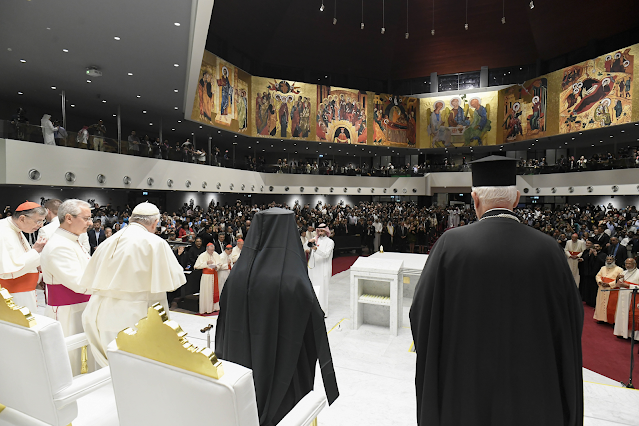Pope Francis urges Catholics in the MidEast to promote peace
At a Mass on November 5 attended by over 30,000 Christians from all across the Arabian Peninsula, Pope Francis emphasised to the region's minority Catholic community that pursuing peace must always be the goal of the Christian life.
There will be disagreements, tense situations, confrontations, and divergent points of view, but the pope underlined that those who follow the Prince of Peace must always work for peace. He asserted that Catholics must persevere in "breaking the cycle of vengeance, disarming violence, and demilitarizing the heart" even when evil is done to them.
The pope underlined during his sermon that peace was not merely a high ideal but rather something that was first put into reality through "concrete situations" every day, such as family life, the workplace, and relationships between neighbours.
The only other occasion a pope has celebrated a Mass on the Arabian Peninsula was on November 5, at Bahrain's National Stadium. During his trip to the United Arab Emirates in 2019, he made history by being the first pope to do so.
Only 80,000 of the 1.8 million inhabitants of the kingdom on the Persian Gulf identify as Catholic, the vast majority of whom are migrant labourers from Sri Lanka, India, the Philippines, and other neighbouring Middle Eastern nations.
The pope accepted this fact and stated that Christians must set an example by being friendly and promoting peace, especially for those who live in remote areas where their neighbours may also be from other cultures or nations.
According to Francis, "This very land is a live symbol of cohabitation in diversity, and in fact, an image of our globe, which is increasingly marked by the incessant movement of people and by a plurality of views, customs, and traditions."
The pope stated that Christ experiences suffering "when he sees in our day and in many parts of the world, ways of exercising power that feed on oppression and violence, seeking to expand their own space by limiting that of others, imposing their own domination and restricting basic freedoms, and in this way oppressing the weak."
He urged Catholics to live unconventional lives that reflect Christ's unwavering love for all people. Francis stated, "Not just when things are going well and we feel like loving, but always."
Francis' primary reason for travelling to the nation was to take part in a significant summit of interreligious leaders, but the small but vibrant Catholic population was equally excited to have the pope visit.
The arrival of "Father Francis" would be an opportunity to demonstrate that "we are all brothers and sisters here," according to Anthony and Maria George-Vincent, a married Indian couple who have lived in Bahrain for more than 30 years and work as Catholic catechists at their parish.
Before the Mass, Anthony George Vincent, 67, told NCR that he hoped it would open other nations' eyes.
Amor Pimentel, who made the 29-year journey from the Philippines to Saudi Arabia, claimed that he and eleven other Catholics drove across the King Fahd Causeway, which joins Saudi Arabia and Bahrain, in one hour.
He added that "this is really sacred for us," and that they were delighted for the opportunity to attend a public Mass since they are unable to do so in Saudi Arabia.
And 74-year-old Frenchman Jean Dtinguy, a finance professional who has lived in Bahrain for 45 years, told NCR that the nation is a "mixing pot" for both cultures and religions.
While Francis stressed the need to avoid syncretism on his second day in the nation on Nov. 5, he also stated that one of the goals of his mission was to advance peace, both through Muslim-Catholic dialogue and among different Christian traditions.
Francis presided over a joint prayer service the night before the papal Mass on November 5 at the Cathedral of Our Lady of Arabia, the biggest Catholic cathedral in the Middle East, where he was joined by other Eastern Orthodox and Anglican religious leaders as well as the Ecumenical Patriarch of Constantinople.



Comments
Post a Comment